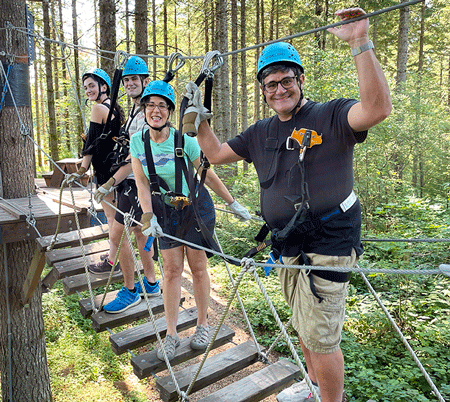Keyword: Overfocusing
Keyword: Overfocusing
The Hollywood strikes versus what makes experiences special in the first place.
By Brad Berens

Credit: ufcw770
Bad products can yield positive experiences, but we don’t have useful tools to describe the difference because we tend to focus more on products than the context in which people use and experience those products.
This is what I mean by overfocusing. It’s not only true of bad experiences. However, the gap between a product and the experience of that product can be helpfully vivid with great experiences around bad (or even mediocre) products.
Here are some examples…
The Blade Master
In 1983, my younger brother Evan and I took in a late show of one of the worst movies ever made: The Blade Master. This was a sequel to Ator: the Fighting Eagle, a swords-and-sorcery bit of fluff rushed into production to capitalize on the Arnold Schwarzenegger version of Conan the Barbarian around that same time. The Blade Master starred Miles O’Keefe, whose prior claim to fame was playing Tarzan to Bo Derek’s often nude Jane in Tarzan the Ape Man (1981). O’Keefe specialized in beefcake roles that weren’t heavy on the talking, so Ator was right in his wheelhouse.
The Blade Master was a terrible movie but a terrific experience because the audience took over. When one couple threw in the towel and started heading toward the exit, a guy two rows in front of me yelled out, “Awwwww, don’t go!” That freed the rest of us to heckle the vomitous mess onscreen.
Later, when Ator and his friends were sidestepping through a forest, with drawn swords and anxious expressions, one of the characters said, “there’s something evil in these woods.” An audience member yelled, “the director!” We howled with laughter.
That night, the audience turned a showing of The Blade Master into a crowdsourced, collaborative, artisanal episode of Mystery Science Theater 3000 (which itself didn’t premiere until a few years later).
The Rocky Horror Picture Show
Last weekend, my son William achieved a teen milestone when he went to see The Rocky Horror Picture Show, which is still playing Saturdays in many American cities nearly 50 years after it premiered. Rocky Horror is a high camp exercise that would never scare anybody (unless they fear drag, which come to think of it is actually a lot of people).
The musical numbers are fun, but it’s not a good movie. All the action is in the audience: frequent viewers who dress up as Frank-N-Furter or Magenta, how everybody sings along, or screams “asshole!” every time Barry Bostwick’s character’s name (which, sigh, happens to be Brad) gets mentioned. If you try to shush the screaming people next to you because you can’t hear the dialogue at a showing of Rocky Horror, then you’ve missed the point.
A Midsummer Night’s Dream
Two Sundays back, William and I took in the closing performance of a production of Shakespeare’s comedy here in Portland. I’ve seen many versions, but it was William’s first Dream.
It was not a great production. There were interesting moments, and it was an impressive feat of logistics since nine actors played all the parts, but it was hard to follow, many of the performers didn’t seem to understand what they were saying, and it dragged. “The Mechanicals Play” in Act 5 remains unkillable material, so the performance ended well, as Dreams always do.
Despite the mediocrity of what happened onstage, William and I had a great time because we had engaged conversations beforehand, during intermission, and after. He wanted to go with me (!) because he’s still trying to figure out why his father is so obsessed with all this Shakespeare stuff. I was thrilled that he has sharp insights about the performance as well as thoughtful questions about the play and its history.
Ziplining
 What I’m talking about with A-level experiences around B-level (or worse) products isn’t just true of narratives. My daughter Helena is in town for a visit, and a few days ago the four of us (me, Helena, William, and La Profesora) all went ziplining a few towns over.
What I’m talking about with A-level experiences around B-level (or worse) products isn’t just true of narratives. My daughter Helena is in town for a visit, and a few days ago the four of us (me, Helena, William, and La Profesora) all went ziplining a few towns over.
Afterwards, we all agreed that none of us love ziplining, but still we had a great time because we were doing it together. (My kids took particular joy in watching my face as I flew down the lines because I’m not crazy about heights or falling to my death.)
All of these experiences are special because people shared them in real time and in the same place, which I’ve talked about previously as one feature of eventness.
My focus in this piece is a little different because here I’m interested in how businesses misunderstand how their products create positive experiences, often despite the quality of the products in question.
What does any of this have to do with the Hollywood strikes?
Last week, SAG-AFTRA (the actors’ union) joined the Writers Guild of America in going on strike against the movie and television studios because how changes in the entertainment industry (streaming, AI) hurt writers and performers. Writing, production, and promotion have all stopped, and it looks like this could go on for quite a while.
I support the writers and actors in this because the last couple of decades of changes to business and media have overwhelmingly benefited platforms and middlemen instead of creators. (See my recent piece about the important book Chokepoint Capitalism for more context.)
The unions are understandably focused on the needs of the creators of movies and television, but what’s often missing from the conversation is how the context of consumption for those products has changed.
This is most clear with movie theaters.
Movie theaters aren’t filled this summer only partly because so many of the movies are bloated over-the-top special effects extravaganzas that all seem the same (enough with the freaking multiverse already).
Another part is that many theater owners aren’t investing in the context of the experience. The food is overpriced, unhealthy, and with a narrow selection. While I relish previews of coming attractions, the half hour of ads for other products (sorry, Maria Menounos, but Noovie is a drag) is a huge disincentive.
Plus, aside from talking about how cool it is to see a movie in a crowded theater—e.g., showing videos of crowded theaters before the feature starts—the theater owners have done nothing to incentivize people to see movies together. If I get five other dads to see the latest action movie with me, we don’t get a price break on the tickets or the beer. Two tickets for date night should be cheaper than two individual tickets.
Theaters could have Kickstarter-like micro-events around influencers where followers get a cheaper ticket once a threshold number of tickets are sold… with an influencer-led discussion happens after the credits. Even if the movie weren’t great, the experience could be.
COVID lockdown reminded us that most people need to be physically around other people at least some of the time to thrive.
As writers, actors, and studios wrestle with their shared future around the creation of movies and television shows, they should also resist overfocusing on that creation.
Often, life’s best experiences aren’t memorable because of the things you do but because of the company you keep while doing them.
__________

Brad Berens is the Center’s strategic advisor and a senior research fellow. He is principal at Big Digital Idea Consulting. You can learn more about Brad at www.bradberens.com, follow him on Post and/or LinkedIn, and subscribe to his weekly newsletter (only some of his columns are syndicated here).
Further Reading:
I wrote about Overfocusing and Immersion around two dueling versions of the song “In Other Words” (a.k.a. “Fly Me To The Moon”) by Frank Sinatra and Tony Bennett back in February of 2022.
Some early thinking around this issue came in When businesses ask the wrong question about how the big American automakers weren’t thinking clearly about the threat from ride hailing (May 2019).
In May of 2018 I wrote about the social nature of memorable experiences in Marvel’s new “Avengers: Infinity War” movie and the structure of special experiences.
__________
See all columns from the Center.
July 21, 2023

